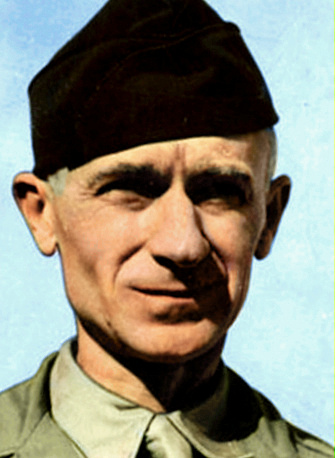The Pittsburgh Press (March 12, 1945)

Roving Reporter
By Ernie Pyle
IN THE MARIANAS ISLANDS (delayed) – On one of these islands the other day, I finally got around to getting a month-overdue haircut.
My barber was a soldier, barbering in a tent, and I sat in an old-fashioned black leather Japanese barber chair he had dug up on the island.
He had been trained in the conversational school of barbering, and as the snipped gray locks fell about my shoulders, there came forth from him such a tale of woe and unkind fate as I have never heard in this world.
This barber was Pvt. Eades Thomas, from Richmond, Kentucky, near Lexington in the horse country. In fact, Pvt. Thomas was a horse-trainer before the war, and was never a barber at all. He just picked that up on the run somewhere.
Well, Pvt. Thomas has been in the Pacific 33 months. It began to look as though he might as well count on settling down for life, so some months ago he married a Scottish girl in Honolulu. Shortly after that, he was shipped on out there, and he hasn’t seen her since.
Bad memory
The morning of the day that I sat in his barber chair, the Army was sending a few Japanese prisoners back to Hawaii by airplane. They had to have guards for them. So, one of Pvt. Thomas’ officers told him he would put him down for the trip, and thus he could get a couple of days in Hawaii to see his wife.
The officer meant to keep his word, but he had a bad memory for names. So, when he went to write down Pvt. Thomas’ name for the trip, he actually wrote another guy’s name, thinking it was the barber. By the time Thomas found it out, it was too late.
“I could have cried,” he said. And I could have too. I felt so terrible about it I couldn’t get it off my mind, and was telling it to an officer that evening.
“Oh,” he said. “I happen to know about that. I’ll go and tell Pvt. Thomas right away and he won’t feel so bad. We got orders not to send the prisoners after all, so the whole thing was called off. Nobody went.”
Which is the kind of joy you get when you stop hitting yourself on the head with the hammer, but at least it’s better than if you kept on hitting it.
Couple of Hoosiers
On that same island I ran onto a couple of old Hoosier boys, who had followed my inglorious footsteps at Indiana University.
One was Lt. Ed Rose, who was editor of The Daily Student in 1938, just as I was for a while in 1922. Apparently, it doesn’t make any difference what year you were editor of The Student, you still wind up in the Marianas Islands.
The other was Lt. Bill Morris, from Anderson, Indiana, who graduated from our illustrious alma mater in 1942. Both the boys are mail censors out here. Life is kind enough to them, and they haven’t much to kick about.
It’ll be several weeks before I get around to doing some columns on the fabulous Seabees, but I do keep running into them on my meanderings about these islands.
The other day, one of them came in to see me. He was obviously in his forties, and very different and shy, and so polite I couldn’t get him to sit down. He had on the green work clothes the Seabees wear over here.
The reason he came was that he lives in Albuquerque, and just wanted to say hello. His name is John D. Gee, and he had been a postal clerk in Albuquerque for 18 years. Over here he is in charge of the post office for his battalion.
I think he must be typical of the craftsmanship and the sincerity of the Seabees. He is 44 years old, and has a wife and 14-year-old boy back home, and wouldn’t have to be in the war at all. But here he is.